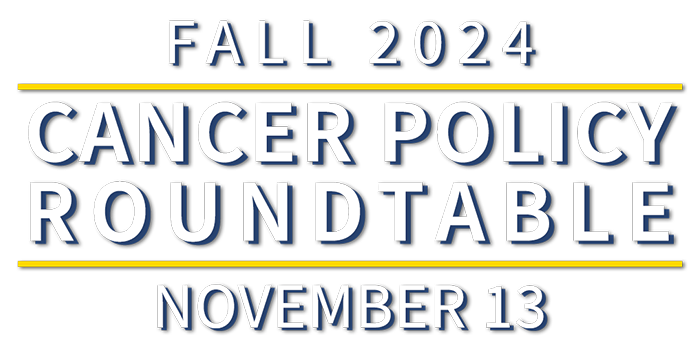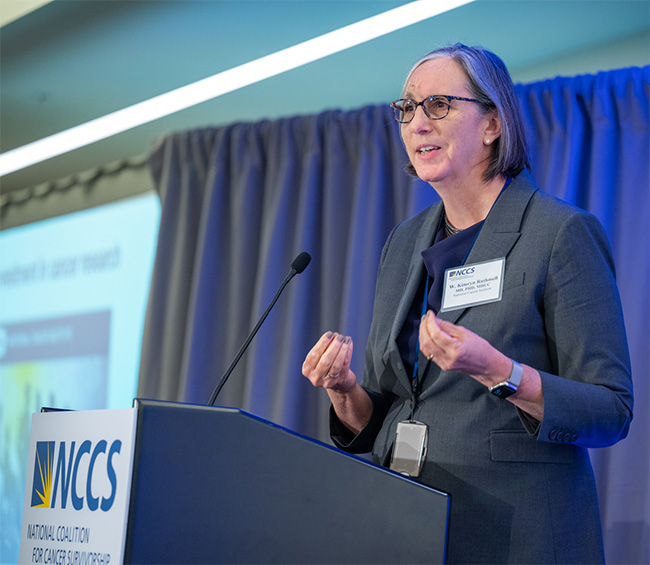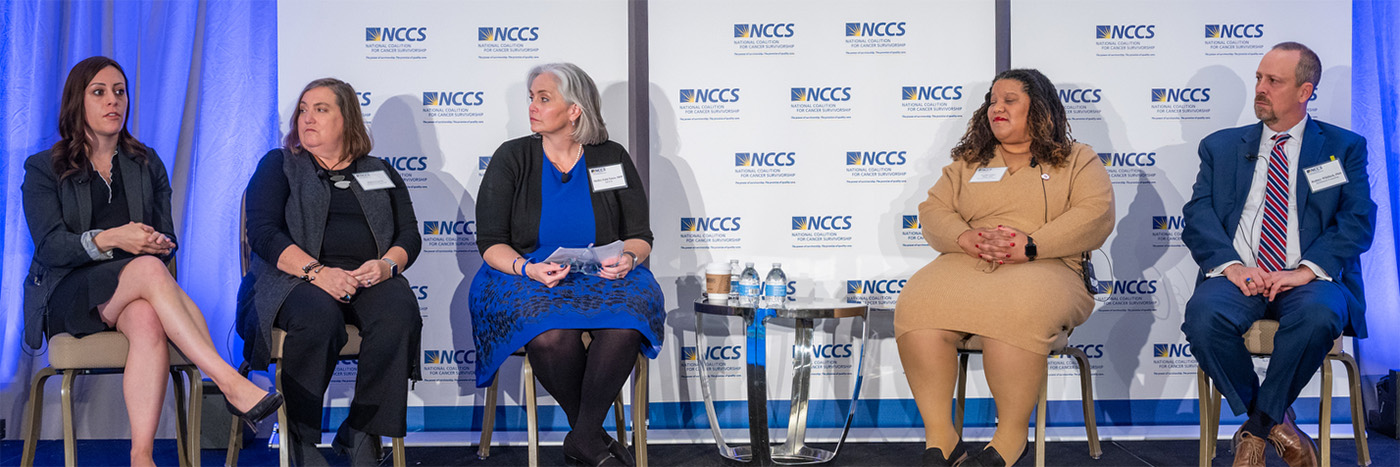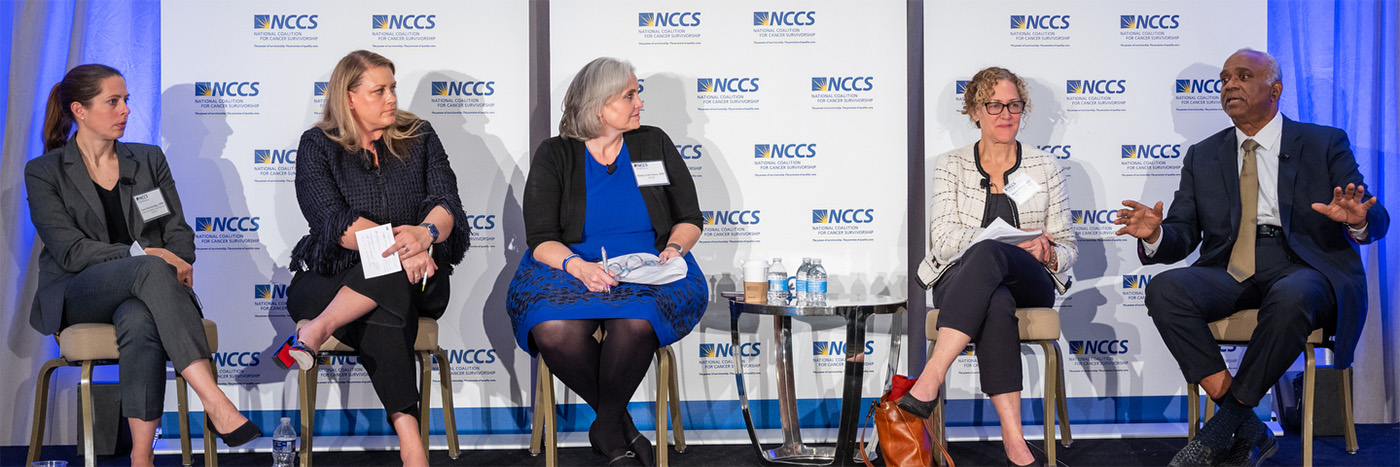Fall 2024 Cancer Policy Roundtable
Since 1986, NCCS has been a trusted source in the cancer community and a leading voice in the field of cancer survivorship. For more than 20 years, NCCS has hosted twice yearly Cancer Policy Roundtable (CPR) meetings, convening diverse stakeholders to discuss pressing cancer policy issues.
NCCS convened another successful Cancer Policy Roundtable on Thursday, March 28, 2024, hosting a compelling series of panels and guest speakers, discussing the critical issues in quality cancer survivorship care.
Sessions
Keynote Presentation
“Further, Faster: Working Together to End Cancer As We Know It”
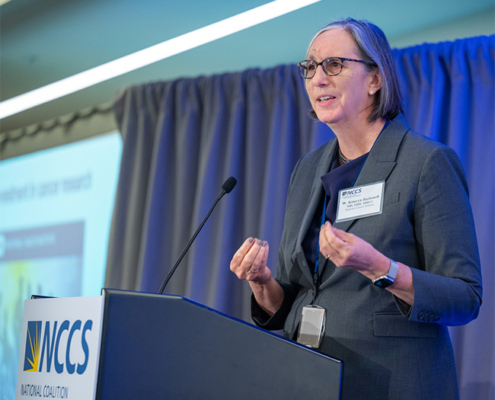
Kimryn Rathmell, MD, PHD
Director
National Cancer Institute
“We’re very lucky in cancer to have very broad bipartisan support. That has always been true. I’ve met with members of Congress on all sides and have never met someone who wasn’t fully supportive… When I talk to folks, especially on appropriations, they really want to fund the work that we do. And to me, the most important part is to help them see where there’s real value added — how it is that we help extend lives, save lives, but also create a good workforce and stimulate the economy.”
Fall 2024 Cancer Policy Roundtable attendees were inspired by NCI Director Dr. Kimryn Rathmell’s keynote presentation “Further, Faster: Working Together to End Cancer As We Know it.” She shared an optimistic but realistic assessment of cancer research progress, emphasizing the importance of clinical trial access. She noted a statistic from NCCS’s 2024 State of Survivorship Survey that 74% of people who don’t participate in clinical trials never were asked, highlighting a clear opportunity for improvement.
She outlined NCI’s commitment to modernizing clinical trials and shared an example of the PragmaticaLung Study to illustrate how NCI aims to streamline clinical trials and make them more accessible. Dr. Rathmell noted that simpler, more efficient trial designs can still generate valuable scientific insights while enrolling patients more quickly. She highlighted several key areas for increased NCI investment, including early onset cancers, financial toxicity, and cancer vaccine development.
Kimryn Rathmell, MD, PHD– Director National Cancer Institute
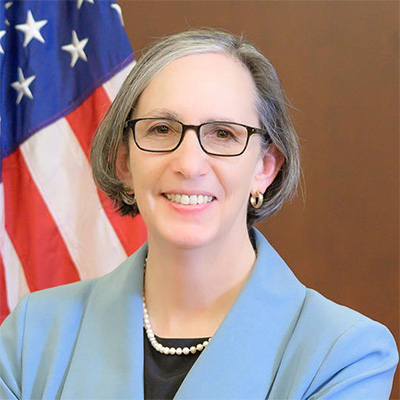 Kimryn Rathmell, MD, PHD, MMHC
Kimryn Rathmell, MD, PHD, MMHC
Director, National Cancer Institute
W. Kimryn Rathmell, MD, PhD, MMHC, was sworn in as the 17th NCI director on December 18, 2023. She previously led the Vanderbilt University Medical Center as physician-in-chief and chair of the Department of Medicine.
Dr. Rathmell has held leadership positions with the American Society of Clinical Oncology and the American Society for Clinical Investigation, serving as secretary–treasurer and president. As a result of her efforts, Dr. Rathmell has been elected to the Association of American Physicians, the American Academy of Arts and Sciences, and the National Academy of Medicine.
Dr. Rathmell’s specialty is the research and treatment of complex and hereditary kidney cancers. She also focuses on underlying drivers of kidney cancers using genetic, molecular, and cell biology to develop interventions to improve patients’ lives. Dr. Rathmell’s research has resulted in more than 250 articles in leading peer-reviewed journals, including The New England Journal of Medicine, Nature, Proceedings of the National Academy of Sciences, and the Journal of Clinical Investigation.
NCCS State of Survivorship Results
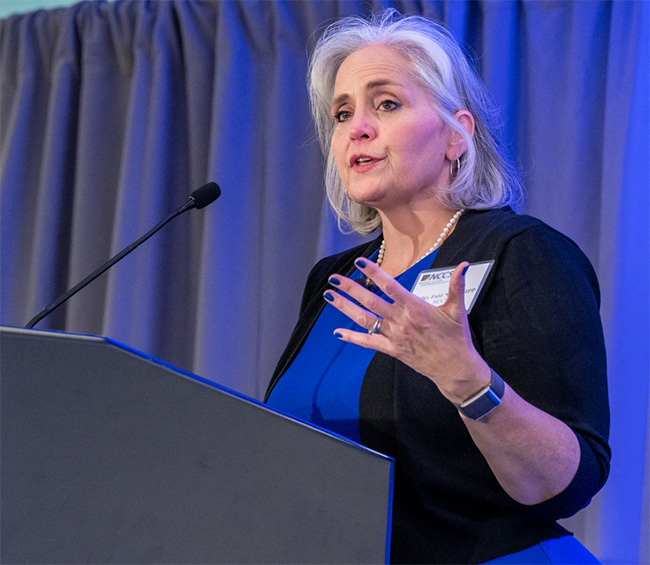 Shelley Fuld Nasso, MPP
Shelley Fuld Nasso, MPPChief Executive Officer
National Coalition for Cancer Survivorship
Summary
NCCS CEO Shelley Fuld Nasso summarized the findings of our 2024 State of Survivorship Survey, particularly the results related to young adult cancer survivors, as well as data on post-treatment survivorship. Over the years, NCCS surveys have consistently highlighted the substantial physical,financial, and emotional burdens faced by young adults. In 2024, NCCS partnered with Stupid Cancer to oversample this population. Some key data points:
- While just over a third (35%) of respondents felt they needed to advocate for themselves to get the best care, certain groups were much more likely to need to advocate for themselves: Black patients (59%), younger patients (56%) and Hispanic patients (48%). These groups are also less likely to rely solely on their doctors’ recommendation.
- Two-thirds of people who are five years or less from treatment are receiving post-treatment care. Among those more than five years out, only one-third are receiving post-treatment care. The primary reason cited for not receiving post-treatment care was that their physician deemed it unnecessary.
- There has been a significant decline in primary care physician management of post-treatment care, which decreased from 40% to 30% to just under 20% over the past three years. Meanwhile, the percentage seeing their oncologist has increased and only 38% said they would be willing to have a primary care physician manage their post-treatment care.
- Only 29% of patients sought a second opinion, though this was higher for younger patients (47%), Hispanic patients (43%), LBGTQ+ patients (42%), and people living with Stage IV cancer (41%). The main reason patients didn’t seek a second opinion was that they trusted their health care team.
The full survey results are available at canceradvocacy.org/2024-state-of-cancer-survivorship-survey.
Shelley Fuld Nasso, MPP– CEO, National Coalition for Cancer Survivorship (NCCS)
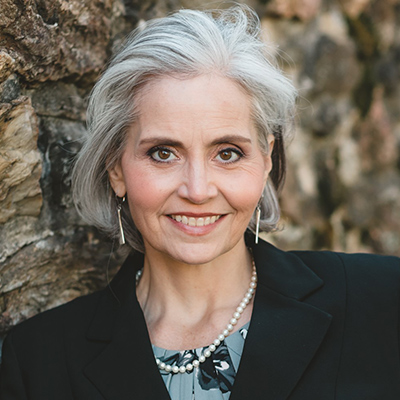 Shelley Fuld Nasso, MPP
Shelley Fuld Nasso, MPP
Chief Executive Officer
National Coalition for Cancer Survivorship (NCCS)
As Chief Executive Officer, Shelley Fuld Nasso leads the public policy activities of NCCS at a time of rapid and fundamental health care system change. Shelley joined NCCS in December 2012 and was named CEO in October 2013.
Prior to joining NCCS, Shelley served in leadership roles at Susan G. Komen, where she leveraged Komen’s grassroots network in Washington, D.C., and in state capitals. There she built relationships with policymakers and partner organizations and led a team of staff and volunteer leaders to influence state budgets and legislation. Under her leadership, Komen successfully secured $80 million in state funding for cancer screening and treatment for uninsured and under-insured women. She and her team also expanded the Komen grassroots advocacy program from a pilot of seven affiliates to more than 100 affiliates across the country engaged in federal and state advocacy efforts. Shelley has also served as Director of Community Philanthropy at The Dallas Foundation and held management positions at communications and technology enterprises. She is a graduate of Rice University and holds a Master of Public Policy from the Harvard Kennedy School.
Shelley’s commitment to the work of NCCS is strongly tied to the experiences in the cancer care system of her dear friend, Dr. Brent Whitworth, a beloved physician who was diagnosed with stage IV cancer days before his 42nd birthday and who passed away 19 months later. Through Brent’s experiences, Shelley witnessed the strengths and flaws of the cancer care system and embraces the notion that policy change can make cancer care better for patients and caregivers. Shelley and her husband Michael live in Maryland and are the parents of three young boys.
Survivor Perspective
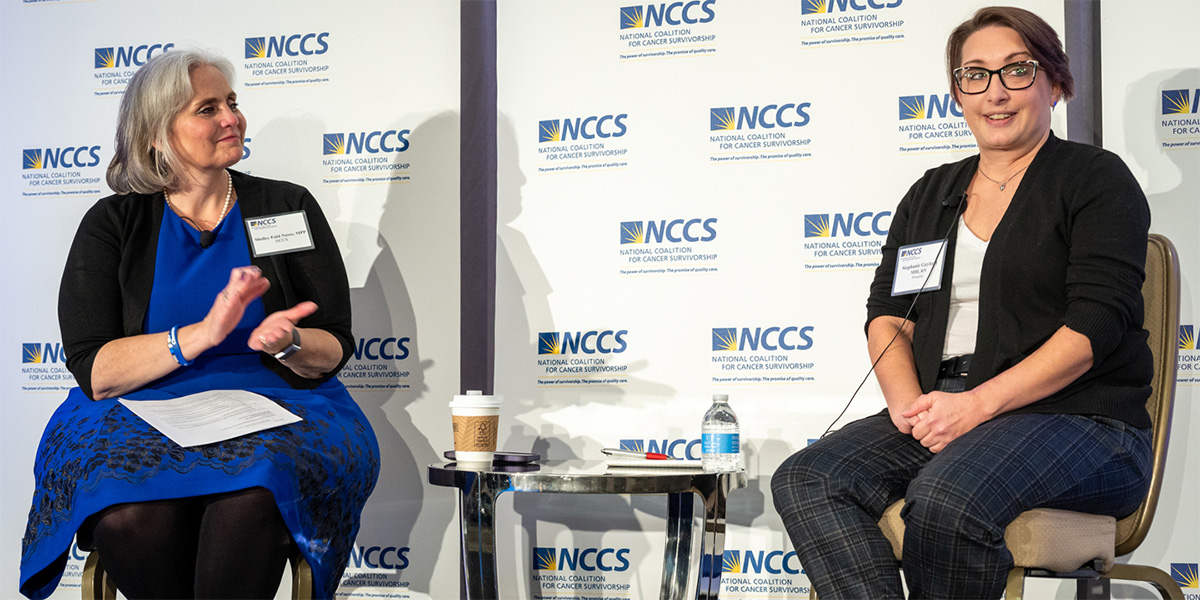
AYA Cancer Survivor
Chief Learning Officer
Presently
Chief Executive Officer
National Coalition for Cancer Survivorship
“We’re finding that that [peer support] really helps with patient activation. It empowers them. It makes them want to go out and do more, which is what we need, because we’ve created this dependency on the health care system, and we want patients to do more for themselves, but we haven’t figured out how to do it. And I think the answer is empowering them.”
Summary
Cancer survivor, nurse, and wellness coach Stephanie Gayhart shared her powerful story as a young adult survivor, diagnosed with oral cancer at age 37. Her experience illustrated the cascading effects of cancer on family life, career, and long-term wellbeing. She talked about her Initial misdiagnosis and delayed diagnosis due to age bias. Gayhart recalled preparing her six-year-old son for her treatment. “Before my surgery, I taught him sign language because I didn’t know if I was ever going to be able to talk again. And the one I taught him was, ‘I love you’.”
Gayhart discussed the high need for mental health support for cancer survivors. She described her work developing trauma-informed peer support groups through Presently, where she creates curriculum and trains cancer survivors to be peer support facilitators. She explained that in their pilot program with Kaiser in San Francisco, participants reported that, despite support from family, friends, and physicians, they found the most value in connecting with others who had shared similar cancer experiences. She emphasized that peer support is valuable not only because participants receive support, but because giving support to others helps with patient activation and empowerment.
Stephanie (Stef) Gayhart, MHI, RN– Presently
 Stephanie (Stef) Gayhart, MHI, RN
Stephanie (Stef) Gayhart, MHI, RN
AYA Cancer Survivor
Chief Learning Officer
Presently
Stephanie (Stef) Gayhart is a registered nurse, certified trauma-informed coach, and a young adult head & neck cancer survivor with extensive experience in critical care, clinical education, and survivorship programs. With a Master in Healthcare Innovation and a deep commitment to empathetic design thinking, Stef brings her passion for patient-centered care and expertise in trauma-informed coaching to her current role as Chief Learning Officer at Presently — an early-stage startup providing a blended model of trauma-informed peer support to cancer survivors.
Shelley Fuld Nasso, MPP– CEO, National Coalition for Cancer Survivorship
 Shelley Fuld Nasso, MPP
Shelley Fuld Nasso, MPP
Chief Executive Officer
National Coalition for Cancer Survivorship (NCCS)
As Chief Executive Officer, Shelley Fuld Nasso leads the public policy activities of NCCS at a time of rapid and fundamental health care system change. Shelley joined NCCS in December 2012 and was named CEO in October 2013.
Prior to joining NCCS, Shelley served in leadership roles at Susan G. Komen, where she leveraged Komen’s grassroots network in Washington, D.C., and in state capitals. There she built relationships with policymakers and partner organizations and led a team of staff and volunteer leaders to influence state budgets and legislation. Under her leadership, Komen successfully secured $80 million in state funding for cancer screening and treatment for uninsured and under-insured women. She and her team also expanded the Komen grassroots advocacy program from a pilot of seven affiliates to more than 100 affiliates across the country engaged in federal and state advocacy efforts. Shelley has also served as Director of Community Philanthropy at The Dallas Foundation and held management positions at communications and technology enterprises. She is a graduate of Rice University and holds a Master of Public Policy from the Harvard Kennedy School.
Shelley’s commitment to the work of NCCS is strongly tied to the experiences in the cancer care system of her dear friend, Dr. Brent Whitworth, a beloved physician who was diagnosed with stage IV cancer days before his 42nd birthday and who passed away 19 months later. Through Brent’s experiences, Shelley witnessed the strengths and flaws of the cancer care system and embraces the notion that policy change can make cancer care better for patients and caregivers. Shelley and her husband Michael live in Maryland and are the parents of three young boys.
Health Policy Outlook for 2025
Panel Discussion
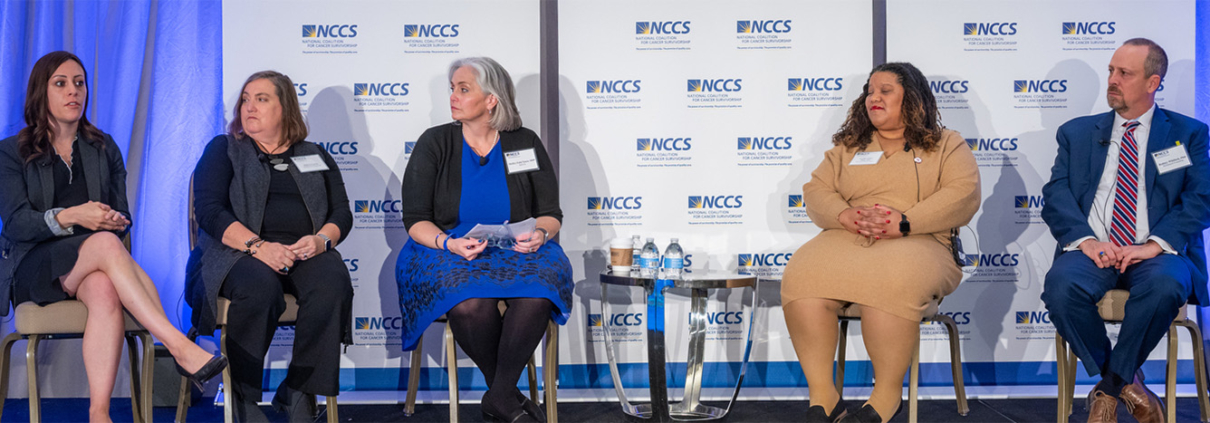
Former U.S. House Staff Member
Debra Curtis
McDermott+ Consulting
National Urban League
Rodney Whitlock, PhD
McDermott+ Consulting
Shelley Fuld Nasso, MPP (Moderator)
CEO, National Coalition for Cancer Survivorship
Summary
The discussion provided nuanced insight into health care priorities under the new administration. As Debbie Curtis noted, “Health care is not the number one Trump agenda…but health care impacts every single person.” Rodney Whitlock emphasized that while dramatic changes to health care policy may be unlikely, stakeholders must remain vigilant: “The clown car show of 2017, I’m going to generously give them the opportunity to show that, in fact, they might have learned something.”
The panelists assessed the fate of the Affordable Care Act (ACA), with a consensus that unlike 2017, a full repeal attempt is unlikely. However, they anticipate potential changes through insurance deregulation, modifications to tax credits, and state-level flexibility in Medicaid, reforms to Medicare Advantage, and rural health care access. Other policy changes will depend on personnel tapped to lead the various health agencies.
The panel emphasized that advocacy strategy will need to evolve. Emily Mace, a former Republican House staff member, emphasized the importance of sharing patients’ stories and talking with members of Congress in the district and before legislation is proposed. “When you tell the stories and when you come in and have an honest conversation and come to them from a place of respect and wanting to collaborate with them, you can almost always do that,” she said.
Lydia Isaac of the National Urban League provided an optimistic charge to the audience, emphasizing that “whoever you voted for, it actually doesn’t matter right now. The people who are elected are working for the people of the United States, and we have to hold them accountable.”
About the Panel Speakers
Emily Mace, JD– Deputy Chief of Staff and Counsel, U.S. House of Representatives
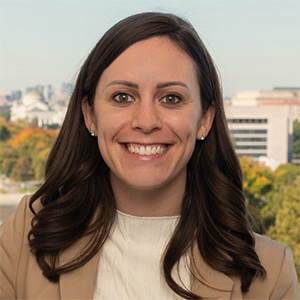 Emily Mace, JD
Emily Mace, JD
Deputy Chief of Staff and Counsel
U.S. House of Representatives
Emily Mace is Deputy Chief of Staff & Counsel in the office of Congressman Larry Bucshon (IN-08), where she manages the health policy portfolio. A Midwesterner by background, Emily started on Capitol Hill in the summer of 2017 after graduating from the University of Missouri with degrees in law and health administration. She worked previously for Representatives from Arkansas and Virginia.
Debra Curtis– McDermott+ Consulting
 Debra Curtis
Debra Curtis
McDermott+ Consulting
Debra Curtis is a highly-respected health policy authority who helps clients advance their missions in Congress and beyond. With more than three decades of experience working both on the Hill and with the health insurance exchange marketplace, she helps clients execute payment strategy, see around the corner on policy and regulatory changes, and pursue effective advocacy. In addition, Debbie has deep experience working closely with payers, industry stakeholders and government officials at the federal, state and local levels.
During her 24 years as a Congressional Staffer, Debbie served most recently in a joint position as Chief of Staff to US Representative Pete Stark (D-CA), and as a professional staff member on the US House of Representatives Committee on Ways & Means, Health Subcommittee. Debbie was integrally involved in the creation and movement of health legislation through the committee, with a focus on improving and protecting Medicare. She was a key staffer in the development of the Affordable Care Act, and worked closely with the Administration and other Congressional committees and Leadership on the implementation of the law.
Debbie joins McDermott+ from the DC Health Benefit Exchange Authority, where she was part of the founding team that established and operated DC Health Link, the District of Columbia’s online state-based health insurance exchange marketplace. In that capacity, she worked closely with stakeholders, advocates and government officials at the local and federal levels and led the Authority’s interactions with the Centers for Medicare and Medicaid Services.
Lydia Isaac, PhD, MSc– National Urban League
 Lydia Isaac, PhD, MSc
Lydia Isaac, PhD, MSc
Vice President, Health Equity and Policy
National Urban League
Lydia Isaac is the Vice President for Health Equity and Policy at the National Urban League. Dr. Isaac has a faculty appointment at the Johns Hopkins Bloomberg School of Public Health in the Department of Health Policy and Management. She most recently served as the Executive Director of the RWJF funded Health Policy Research Scholars Program (HPRS) program where she was responsible for the day-to-day operations and curriculum development for the program. Previously, she was the Director of Policy and Health Systems Analysis in the Office of Policy, Planning and Strategic Data in the First Deputy Commissioner’s office at the NYC Department of Health and Mental Hygiene.
Dr. Isaac has worked in local and state government throughout her career and in academia where she has taught classes on community health assessment and the social disparities in health. She has a bachelors’ degree in Ecology and Evolutionary Biology from Princeton University, a Master of Science degree in Health and Social behavior from the Harvard School of Public Health and a doctorate in Health Policy and Management from the Johns Hopkins Bloomberg School of Public Health.
Dr. Isaac’s research interests include advancing Health Equity through translating research into policy and practice, investigating the mechanisms that lead to racial and ethnic health disparities, the social determinants of health and the neighborhood environment and its role in health promotion.
Rodney Whitlock, PhD– McDermott+ Consulting
 Rodney Whitlock, PhD
Rodney Whitlock, PhD
McDermott+Consulting
Rodney is an accomplished health care advisor with more than two decades on the Hill where he specialized in rural health, the health care safety net and disability policy.
With more than 25 years of experience, Rodney possesses and offers clients the kind of knowledge that is uniquely available to those who have drafted and advanced legislation. He strategically guides clients through dense Medicare and Medicaid issues that have significant business impact.
While working in Congress, Rodney served as former US Representative Charlie Norwood’s (R-GA) health policy director where he managed the Patients’ Bill of Rights (S.1890), among other notable health policy matters. Rodney then went on to serve Senator Chuck Grassley (R-IA) in the Senate. He first joined the Senate Finance Committee Staff as a health policy advisor to Chairman Grassley, and ultimately joined the Senator’s personal office as health policy director. During his time in the Senate, Rodney served as the lead Republican staffer for Medicaid legislation from 2005 to 2010, and continued to serve Senator Grassley on all health-related issues through 2015. During his time in the Senate, Rodney helped staff Republicans in the Senate on such prominent and important legislation as the Deficit Reduction Act of 2005, Tax Relief and Health Care Act of 2006, CHIP Reauthorization Act of 2007 and 2009 and Affordable Care Act of 2010.
For the last 20 years, Rodney has been an adjunct faculty member at the George Washington University Milken Institute School of Public Health’s Department of Health Policy and Management, and the Graduate School of Political Management’s Department of Legislative Affairs. Hundreds of students have taken Rodney’s courses and have gone on to pursue careers in Washington, DC.
Shelley Fuld Nasso, MPP– CEO, National Coalition for Cancer Survivorship
 Shelley Fuld Nasso, MPP
Shelley Fuld Nasso, MPP
Chief Executive Officer
National Coalition for Cancer Survivorship (NCCS)
As Chief Executive Officer, Shelley Fuld Nasso leads the public policy activities of NCCS at a time of rapid and fundamental health care system change. Shelley joined NCCS in December 2012 and was named CEO in October 2013.
Prior to joining NCCS, Shelley served in leadership roles at Susan G. Komen, where she leveraged Komen’s grassroots network in Washington, D.C., and in state capitals. There she built relationships with policymakers and partner organizations and led a team of staff and volunteer leaders to influence state budgets and legislation. Under her leadership, Komen successfully secured $80 million in state funding for cancer screening and treatment for uninsured and under-insured women. She and her team also expanded the Komen grassroots advocacy program from a pilot of seven affiliates to more than 100 affiliates across the country engaged in federal and state advocacy efforts. Shelley has also served as Director of Community Philanthropy at The Dallas Foundation and held management positions at communications and technology enterprises. She is a graduate of Rice University and holds a Master of Public Policy from the Harvard Kennedy School.
Shelley’s commitment to the work of NCCS is strongly tied to the experiences in the cancer care system of her dear friend, Dr. Brent Whitworth, a beloved physician who was diagnosed with stage IV cancer days before his 42nd birthday and who passed away 19 months later. Through Brent’s experiences, Shelley witnessed the strengths and flaws of the cancer care system and embraces the notion that policy change can make cancer care better for patients and caregivers. Shelley and her husband Michael live in Maryland and are the parents of three young boys.
The Cancer Drug Acquisition, Coverage, and Payment System: Does it Support Quality Cancer Care and Protect Affordable Patient Access to Quality Care?
Panel Discussion
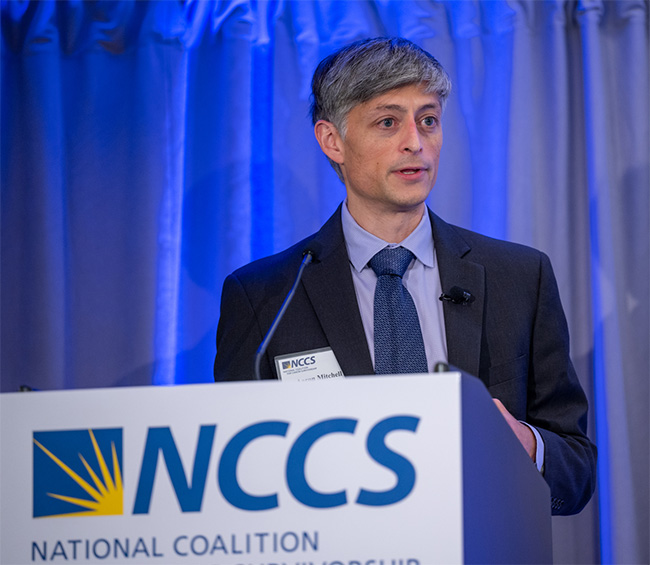 Aaron Mitchell, MD, MPH
Aaron Mitchell, MD, MPHOncologist, Health Services Researcher
Memorial Sloan Kettering Cancer Center
Summary
In his analysis of cancer drug payment systems, Dr. Aaron Mitchell, an oncologist and health services researcher from Memorial Sloan Kettering, explained how the current “buy and bill” system directly links physician compensation to drug prices, creating potential conflicts of interest. His memorable quote captured the ethical tension: “It feels like we’ve somehow crossed a threshold from doctors making money for taking care of patients, which I don’t think anyone is supposed to, and at some point crossed over to what feels like viscerally, doctors making money off of patients.”
His research revealed that commercial insurers typically pay about triple the Medicare rates for drugs, leading to significant profit margins for providers. While research suggests this compensation model might influence whether treatment is initiated, Mitchell found surprisingly that it does not appear to affect which specific drugs physicians choose when treating patients.
He recommended reforming the system to separate physician compensation from drug costs, while ensuring sustainable practice models, emphasizing that such changes must be carefully implemented to maintain access to care. The evidence suggests that realigning financial incentives could be achieved without compromising quality of care, though careful monitoring would be essential to ensure patient access is preserved.
Aaron P. Mitchell, MD– Memorial Sloan Kettering Cancer Center
 Aaron P. Mitchell, MD
Aaron P. Mitchell, MD
Oncologist, Health Services Researcher
Memorial Sloan Kettering Cancer Center
Dr. Aaron P. Mitchell is an oncologist in New York City, and is affiliated with Memorial Sloan Kettering Cancer Center. He received his medical degree from New York University Grossman School of Medicine and has been in practice between 11-20 years. Dr. Aaron P. Mitchell has expertise in treating chronic leukemia, prostate cancer, among other conditions.
Medicare Drug Price Negotiation Update
Panel Discussion
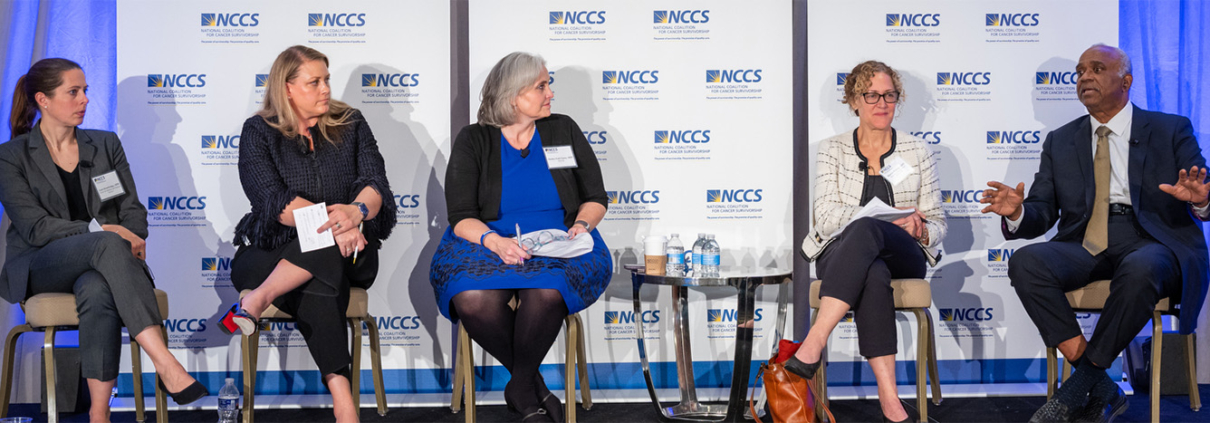
Centers for Medicare & Medicaid Services
Elizabeth Carpenter
PhRMA
Shawn Maree Bishop, MPP
Akin Gump Strauss Hauer & Feld LLP
National Minority Quality Forum
Shelley Fuld Nasso, MPP (Moderator)
CEO, National Coalition for Cancer Survivorship
Summary
This panel provided a look at the implementation and implications of Medicare drug price negotiations that were enacted as part of the Inflation Reduction Act (IRA). Lara Strawbridge of the Centers for Medicare and Medicaid Services (CMS) detailed the results of the first round of negotiations, which achieved a 22% reduction in costs for negotiated drugs, projecting $6 billion in savings, including an estimated $1.5 billion in beneficiary savings by 2026. She also described process improvements for the second round of negotiation set for 2025, including restructured patient engagement through smaller, private roundtables; enhanced data collection methods, and streamlined negotiation timeframes. She emphasized stakeholder engagement: “Our door is always open. We know that we haven’t got it all right yet and we are going to evolve.”
Elizabeth Carpenter from PhRMA raised several industry concerns, including potential impacts on small molecule drug development, market stability, and post-approval research. She noted: “50% of what we’re spending is going to somebody who didn’t make the medicine…we should also ask questions about that other 50%, where is that going?”
Shawn Bishop, a former U.S. Senate staff member drawing from her experience helping craft the legislation, provided valuable context on statutory requirements and timeframes, as well as areas where CMS has flexibility in implementation: “The statute allows for that a lot of leeway there. CMS does not have leeway to not consider a certain factor, but how it considers it, that’s up to CMS.”
The panel debated the potential impact on rare disease treatments and community oncology practices. A key point of discussion was the “technical fix” proposed by community oncologists to maintain physician compensation levels while reducing drug prices. The panel acknowledged the complexity of balancing cost reduction with maintaining access and innovation.
Gary Puckrein of the National Minority Quality Forum provided a perspective on health equity and systemic reform: “By 2050, when we should have cancer reduced to a common disease that we can control… how do we pay for that? IRA isn’t going to do that.” He emphasized the need to focus on outcomes rather than just cost savings.
About the Panel Speakers
Lara Strawbridge, MPH– Centers for Medicare & Medicaid Services
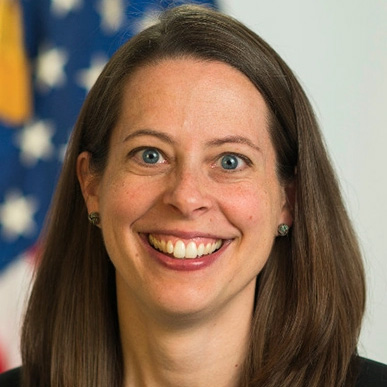 Lara Strawbridge, MPH
Lara Strawbridge, MPH
Deputy Director for Policy
Medicare Drug Rebate and Negotiations Group
Centers for Medicare and Medicaid Services
Lara Strawbridge, MPH is the Deputy Director for Policy in the newly-formed Medicare Drug Rebate and Negotiations Group in the Center for Medicare. In this role, Ms. Strawbridge helps to lead the policy development and implementation of the Medicare Prescription Drug Inflation Rebate Program and the Medicare Drug Price Negotiation Program, as created by the Inflation Reduction Act of 2022.
Previously Ms. Strawbridge was Director of the Division of Ambulatory Payment Models in the Patient Care Models Group in the Center for Medicare and Medicaid Innovation (CMMI), where she led CMS’s efforts on Part B drug models as well as physician specialty models, such as the Oncology Care Model, Enhancing Oncology Model, and Radiation Oncology Model.
Prior to taking on the Division Director role, Ms. Strawbridge led the Oncology Care Model and also previously worked in CMMI’s Research and Rapid-Cycle Evaluation Group. Ms. Strawbridge began her career in health policy and research at the Institute of Medicine and previously was a teacher in Hertfordshire, England, and Washington, DC. Ms. Strawbridge earned her MPH from Johns Hopkins Bloomberg School of Public Health.
Elizabeth Carpenter– PhRMA
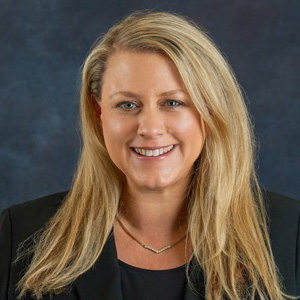 Elizabeth Carpenter
Elizabeth Carpenter
Executive Vice President, Policy and Research
Pharmaceutical Research and Manufacturers of America (PhRMA)
Elizabeth Carpenter serves as executive vice president of policy and research for the Pharmaceutical Research and Manufacturers of America (PhRMA).
Elizabeth joins PhRMA from Avalere, where she spent 10 years, most recently as President. Prior to joining Avalere, Elizabeth was a senior advisor in the Health Policy practice at McKenna Long & Aldridge LLP, where she provided government affairs and public policy support to payers, providers, private exchanges, and states on a wide-range of health policy and political issues. Previously, she served as the associate policy director for the Health Policy Program at the New America Foundation where she led Congressional and media relations during the debate over the ACA and provided educational and technical support to stakeholders, members of Congress, and the media. Elizabeth started her career on Capitol Hill on the legislative and campaign staffs of Senator Lincoln Chafee (RI).
Shawn Maree Bishop, MPP– Akin Gump Strauss Hauer & Feld LLP
Gary Puckrein, PhD– National Minority Quality Forum
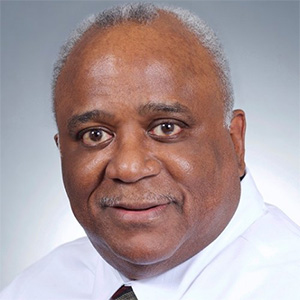 Gary Puckrein, PhD
Gary Puckrein, PhD
President, Chief Executive Officer
National Minority Quality Forum
Gary A. Puckrein, PhD, is President and Chief Executive Officer of the National Minority Quality Forum (formerly the National Minority Health Month Foundation), a not-for-profit organization that he founded in 1998. The Forum addresses the critical need for strengthening national and local efforts to use evidence-based, data-driven initiatives to guide programs to eliminate the disproportionate burden of premature death and preventable illness for racial and ethnic minorities and other special populations. The goal of the Forum is to strengthen the capacity of local communities to eliminate the disproportionate burden of premature death and preventable illness in minority populations through prevention, early detection, and control of disease complications. Dr. Puckrein also serves as the Executive Director of the Alliance of Minority Medical Associations (a collaborative effort of the Asian and Pacific Physicians’ Association, the Association of American Indian Physicians, the Interamerican College of Physicians and Surgeons, and the National Medical Association), which was formed on the basis of evidence-based data that highlight significant disparities in health-care treatment plans and outcomes among many underserved populations within the United States. In April 2001, the National Minority Health Month Foundation launched National Minority Health Month in response to Healthy People 2010, the national health-promotion and disease-prevention initiative.
Dr. Puckrein graduated Phi Beta Kappa from Brown University, where he received his master’s degree (1974) and doctorate (1978). Between 1974 and 1992, he taught and lectured at Roger Williams College, Brown University, Connecticut College, and Rutgers University, where he was a tenured member of the faculty. Dr. Puckrein has received many awards and honors, including being named a visiting scholar and fellow at the Smithsonian’s National Museum of American History and a visiting fellow at Princeton University. He was publisher of American Visions, the country’s leading African American art and cultural magazine, which he launched during his tenure at the Smithsonian Institution and Rutgers University. Dr. Puckrein also created and launched Minority Health Today, which served the needs of clinicians practicing in minority communities.
Shelley Fuld Nasso, MPP– National Coalition for Cancer Survivorship
 Shelley Fuld Nasso, MPP
Shelley Fuld Nasso, MPP
Chief Executive Officer
National Coalition for Cancer Survivorship (NCCS)
As Chief Executive Officer, Shelley Fuld Nasso leads the public policy activities of NCCS at a time of rapid and fundamental health care system change. Shelley joined NCCS in December 2012 and was named CEO in October 2013.
Prior to joining NCCS, Shelley served in leadership roles at Susan G. Komen, where she leveraged Komen’s grassroots network in Washington, D.C., and in state capitals. There she built relationships with policymakers and partner organizations and led a team of staff and volunteer leaders to influence state budgets and legislation. Under her leadership, Komen successfully secured $80 million in state funding for cancer screening and treatment for uninsured and under-insured women. She and her team also expanded the Komen grassroots advocacy program from a pilot of seven affiliates to more than 100 affiliates across the country engaged in federal and state advocacy efforts. Shelley has also served as Director of Community Philanthropy at The Dallas Foundation and held management positions at communications and technology enterprises. She is a graduate of Rice University and holds a Master of Public Policy from the Harvard Kennedy School.
Shelley’s commitment to the work of NCCS is strongly tied to the experiences in the cancer care system of her dear friend, Dr. Brent Whitworth, a beloved physician who was diagnosed with stage IV cancer days before his 42nd birthday and who passed away 19 months later. Through Brent’s experiences, Shelley witnessed the strengths and flaws of the cancer care system and embraces the notion that policy change can make cancer care better for patients and caregivers. Shelley and her husband Michael live in Maryland and are the parents of three young boys.
Key Themes from this Cancer Policy Roundtable
One theme emerged consistently: the critical role of patient voices in policy development. The discussions highlighted how policy changes, whether in drug pricing or care delivery, must be evaluated through the lens of patient access and outcomes.
The meeting demonstrated both the complexity of cancer care policy and the shared commitment to improving outcomes for cancer survivors. While political and systemic challenges remain, the discussions pointed toward opportunities for progress through collaborative effort and patient-centered policy development.
Both panel discussions emphasized the importance of proactive engagement with policymakers and the need to carefully monitor implementation impacts on patient access and outcomes. The conversations highlighted the tension between achieving cost savings and maintaining a robust health care delivery system that serves all patients effectively.
Behind every policy discussion are real patients facing life-changing decisions. As Gary Puckrein powerfully stated: “We need to collaborate to save each other’s lives. That’s our social contract.”
The next Cancer Policy Roundtable is scheduled for March 27, 2025.
Cancer Policy Roundtable Fall 2024


